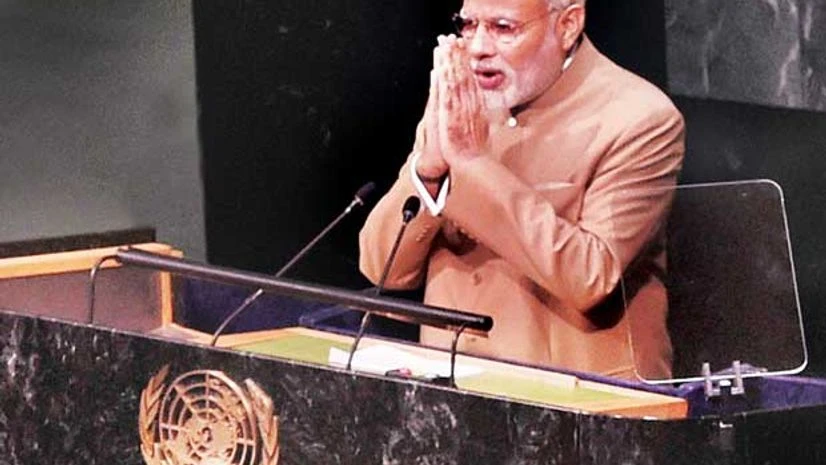Prime Minister Narendra Modi has stressed the need for equity for developing countries and said they shouldn't be condemned for their developmental activities. There should be a common but differentiated and historical responsibility, he added.
"We accept we have a common responsibility to protect the mother planet. But at the same time, the responsibility has to be differentiated. You have to take into account the levels of development of various countries and allow them the developmental space so that they can also aspire to become middle and developed countries," external affairs ministry spokesperson Vikas Swarup said here after Modi's address to the United Nations (UN) Sustainable Development Summit on Friday (local time).
"The historical responsibility of climate change has to be understood. It is very clear which are the countries that are responsible for the state we are in today."
The articulation of climate justice by the PM wasn't "radically different", as developing countries had been saying there should be historical responsibility for climate change and they should not be asked to constrain their developmental choices simply on the grounds of emissions, he added.
Modi also said the emphasis must not be on a negative agenda that said countries should "cap your emissions, control; that is not a way of looking at things". The focus should be on a "positive agenda" to give developing countries finance and transfer of technology that would help them meet developmental goals in a more sustainable way.
"I think his voice and words would have resonated with the whole host of developing countries, which will accept the same principles," Swarup said.
While India's per capita emission is 1.7 (carbon dioxide, in tonnes), the US' is 16 or 17. So, "you cannot now condemn the developing world, which is still at a very low-carbon stage" for their developmental objectives, he added.
Swarup said Modi had consistently emphasised sustainable development, adding India was conscious of its obligations in this regard. He cited India's focus on achieving 175 Gw of renewable energy but said that didn't mean it would give up its developmental choices.
Pressing for UNSC reforms
At the UN General Assembly, the PM pressed for UN Security Council (UNSC) reforms within a "fixed timeframe", saying the world body reflected the mindset of a century "we left behind" and wasn't in tune with issues such as terrorism and climate change.
Hosting a summit of the leaders of Germany, Japan and Brazil on the G-4 platform here, he said the UNSC "must include the world's largest democracies, major locomotives of the global economy and voices from all the major continents" to carry "greater credibility and legitimacy". That, he said, would make it more representative and effective in addressing the challenges of the 21st century.
He noted "some movement" had been witnessed in the decades-old endeavour, when the UN General Assembly took the "significant step" of commencing text-based negotiations on reforms. That, he said, had to be taken to its logical conclusion at the ongoing 70th session of the global body.
'De-link terror from religion'
Acknowledging that the Islamic State, a radical Islamist militant group, posed one of the "greatest challenges" to the international community, the PM emphasised the need to de-link terrorism from religion as a weapon in the fight against terror.
At a meeting with King Abdullah of Jordan on the sidelines of the UN General Assembly session, Modi discussed ways to prevent radicalisation of youth and counter extremist views, Swarup said. He added the only way to tackle international terrorism and the menace of the likes of IS was to have a global response.
On Saturday night, Modi will arrive in Silicon Valley, where he will meet leaders of iconic companies. During his two-day stay in Silicon Valley, he will engage with the Indian-American community and address a gathering of about 18,500 Indian-Americans at the SAP Centre in San Jose.
The PM will also visit the campuses of Tesla, Facebook and Google and hold meetings with the who's who of Silicon Valley, from Tim Cook of Apple to Satya Nadela of Microsoft, Sunder Pichai of Google and Shantanu Narayen of Adobe.

)
